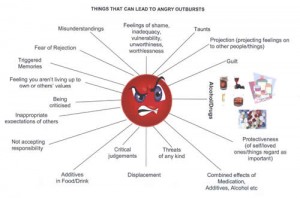A – Anger
Simply put, anger is about a perceived lack of control over a situation, person, thought, belief or feeling. I write perceived because, as with all of our feelings, beliefs and thoughts, it doesn’t mat ter whether they are actually real or not, what matters is that we believe them to be true.
ter whether they are actually real or not, what matters is that we believe them to be true.
As shown (right), there are many things that might trigger anger and because we are all unique, the triggers will be different for each of us. However, anger is not all bad since it can be positive force or a negative one, depending upon how that anger is used and the type of behaviour that is chosen to express it. Used positively, anger brings forth change, it gets people thinking, changes views and opinions and it promotes discussion which in turn leads to action and change. The acceptable way to use anger to promote change is to convert the frustration behind that anger into assertive action. Assertive action is an appropriate and acceptable method for putting your views, wishes and opinions across.
Aggressive anger, on the other hand, is not good for anybody. It seeks to diminish the person you are angry at and at the same time diminishes you by making you feel bad. Even if you are able to justify your anger to yourself, you still have to convince other people that your behaviour is acceptable and that is not an easy task if your behaviour is inappropriate.
on the other hand, is not good for anybody. It seeks to diminish the person you are angry at and at the same time diminishes you by making you feel bad. Even if you are able to justify your anger to yourself, you still have to convince other people that your behaviour is acceptable and that is not an easy task if your behaviour is inappropriate.
So how do we convert anger in our everyday lives? Some examples:
- Let’s say a work colleague is rude to you, instead of being rude back, try politely explaining to that person that you feel they are being rude and that you don’t respond positively to rudeness.
- Anger is sometimes a result of feeling threatened. If we feel insecure we over-defend ourselves by fighting back. A more appropriate response would be to ask ourselves why we feel insecure, and seek ways to dealing with it.
- When somebody cuts you up next time in the car, try to empathise with them instead of cursing them. Try rationalising the situation by considering that their journey may be more urgent than yours. Or maybe normally they are a good driver but today, like all of us, they had a brief lapse in concentration.
- Golden rule: Think first before you respond. Anger is a primitive emotion that we use without thought. If you are able to think first, respond second, you are a long way towards conquering your anger.
